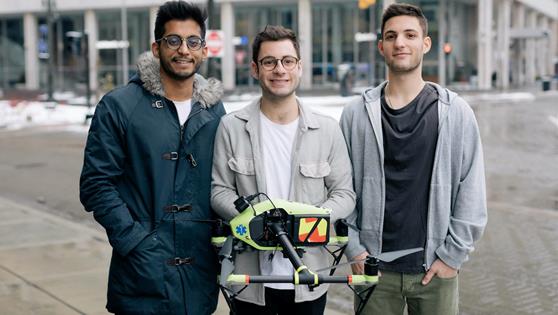
Pictured, from left: Albert Jose, Matthew Tukel and Connor Tukel.
The Global Health Alliance held its first Global and Urban Health Innovation Week April 30-May 4. The week, part of the School of Medicine's year-long 150th anniversary celebration, included a series of events designed to innovate, educate and inspire the world of urban and global health, including a full-day conference, a spoken-word performance, a health inequity seminar, a film screening, a global fiesta celebration and a "Shark Tank"-inspired competition.
All events were free, and were attended by many students, staff, faculty and community members.
The alliance serves to unify the various global health silos throughout the university to more efficiently and strategically leverage collective resources for collaboration and transformative solutions.
First-year medical student Matthew Tukel was one of several presenters at the Ignite to Innovate: Global Shark Tank competition held May 3. The competition was one session of the inaugural Collaborations and Innovations in Global Health conference held the same day in Scott Hall's Green Auditorium. The event attracted students and faculty from the School of Medicine and College of Engineering, as well as medical students and undergraduates from other universities.
The inventions were presented in an abstract session earlier in the week. On May 3, the top six, including Tukel's drone project, were presented to a panel of judges. Tukel, along with MedStart student Connor Tukel and 2018 College of Engineering graduate Albert Jose, started the company Medella after discovering, and falling in love with, the capability of drones.
"My project aims to demonstrate the viability of using drones to get to the scene of an emergency overdose faster than traditional first-responders in order to deliver pre-hospital interventions, namely Naloxone, that can be rapidly administered by bystanders, thus decreasing the amount of time the patient goes without treatment and improving outcomes," Tukel said.
As a historically under-resourced city, Detroit in particular is ripe for low-cost, high-potential interventions that address health issues, he added. The growing trend of opioid misuse and overdose, both locally and nationally, has fueled efforts to find novel, lasting solutions.
"Unmanned Aerial Vehicles, or UAVs, and Unmanned Humanitarian Vehicles, or UHVs, are redefining technological paradigms and allowing for innovation across myriad sectors. In addition to being more dynamic and more cost effective than their vehicular counterparts, 'drones,' as they are commonly referred to, make available the airspace above cars and below planes that, to this point, has gone largely unutilized," Matthew Tukel said.
He and Jose helped found Detroit Aerial Innovations while taking undergraduate classes at WSU. The group wanted to enhance and supplement student education through an extensive hands-on curriculum of UAVs, learning the basics of drone technology - what they're made of, how to build them and how to fly them - in a safe and controlled laboratory environment.
Having the ability to take advantage of this untouched territory will enable the streamlining of many processes that span both the civic and private sectors. The implications are especially significant for the field of emergent public health, as drones may be capable of "shrinking" sprawling urban hubs, Tukel explained, by markedly expediting the rate at which treatment can be accessed and doing so in an efficient, affordable way.
In situations in which minutes and seconds mean the difference between life and death, drones could get to the scene - even before the first responders - and deliver much-needed medical supplies. This model is particularly applicable for cities in which the number of ambulances available does not satisfy the number of patients who beckon their services.
The top three competition winners will receive mentoring for commercialization from James and Patricia Anderson Institute of Engineering Ventures. Among them, Associate Professor of Pediatrics Gaurav Kapur, M.D., and his College of Engineering teammates won second place, including $1,000 cash from James and Patricia Anderson Institute of Engineering Ventures and $10,000 in services and training from International Strategic Management for a technology that calculates blood pressures based on heart sound signals via a single accelerometer-type transducer taped to the patient's chest.
And, Assistant Professor of Urology Nivedita Dhar, M.D., won third place, including $5,000 in services and training from International Strategic Management, for a smart artificial urinary sphincter that helps those with stress urinary incontinence.